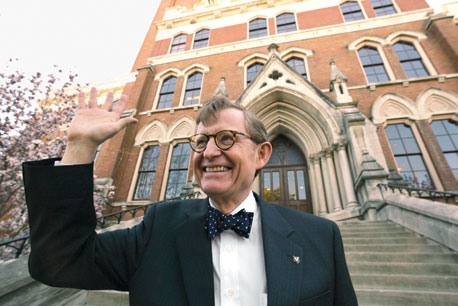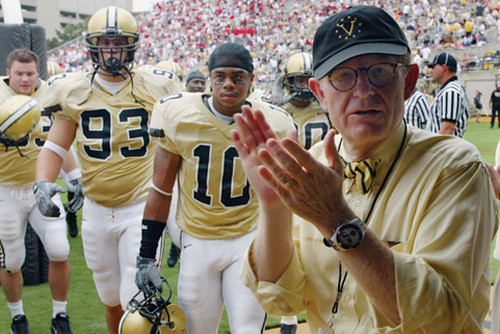
Gordon Gee never was one to follow the playbook. Past Vanderbilt chancellors have always pursued a more or less predictable exit strategy: After a couple of decades leading the university to ever-greater heights, they quietly retire to spend their days serving on foundations and advisory boards, growing more silver-haired and distinguished as chancellors emeriti.
Yet there, on a Thursday last July, was Gordon Gee, only Vanderbilt’s seventh chancellor in its 134-year history, speaking before a board of trustees meeting at Ohio State University, explaining his abrupt decision to leave Vanderbilt and return to Columbus, where he previously served as president from 1990 to 1997. He belonged at a public university, Gee said.
“I am following my heart and returning to a place that I consider my home,” he had told the Vanderbilt community the day before. “My decision is that simple and that complex.”
The announcement came less than three weeks after he had pronounced his “unwavering and unshakeable” loyalty to Vanderbilt when Ohio State–the nation’s largest university–had come courting.
By the time students returned to Vanderbilt in August, the 63-year-old Gee had packed his bags. Vanderbilt had a new interim chancellor, and a chancellor search committee was in place.
Gee has headed more universities than any other American–Vanderbilt, Brown University, Ohio State, the University of Colorado and West Virginia University, where he was elected president at age 37. He has always looked like a college president straight from Central Casting, with his earth-tone tweeds, horn-rimmed glasses, and vast collection of bowties. Never one to shun the limelight, he was beloved by Vanderbilt students. For his first six months at Vanderbilt, he maintained an office in the Sarratt Student Center. He was known for his impromptu visits to Greek Row parties, Vanderbilt’s rank-and-file employee workplaces, and Roads Scholars bus trips to outlying areas. He has a remarkable facility for remembering names and faces, exists on little sleep, thrives on grueling travel itineraries, embraces parades and ceremony, and is a gifted speaker and a prolific writer of personal notes.
He also didn’t mind ruffling feathers. “If you don’t like change, you’re going to like irrelevance even less,” he was fond of saying.

He has been an outspoken critic of abuses in college athletics nationwide. His decision to eliminate the athletics department at Vanderbilt and make athletes more fully part of the rest of the university drew heated debate but ultimately has been judged successful. He recruited star faculty from other institutions and helped Vanderbilt diversify its student body significantly.
Gee’s time at Vanderbilt is noteworthy for its accomplishments, despite the fact that personal issues cast a shadow over his final year here. In September 2006, Gee was the subject of an extensive Page One Wall Street Journal piece that carried the head “Lavish Spending by Star Chancellor” and reported on Vanderbilt trustees’ efforts to more closely monitor his expenditures. It also revealed a 2003-04 total compensation package that was reportedly second-highest in the nation.
A few months later, in February 2007, Gee and his wife, Constance Bumgarner Gee, announced they would seek a divorce. She remains on the Peabody College faculty as an associate professor of public policy and education.
A native of Vernal, Utah, Gee was graduated from the University of Utah with a bachelor’s degree in history and had J.D. and Ed.D. degrees from Columbia University.

His seven-year tenure at Vanderbilt, however brief in comparison to that of his predecessors, is fairly typical of the current state of higher education. The 2007 report of the American College President Study series, conducted by the American Council on Education, found that the average tenure for presidents in 2006 was 8.5 years, and that the average age of presidents has increased from 52 years in a 1986 study to 60 years in 2006.

Provost Named Interim Chancellor
Twenty years to the day after he first arrived in Nashville, Nicholas Zeppos stepped into the role of interim chancellor of Vanderbilt University on Aug. 1. He also serves as provost and vice chancellor for academic affairs and professor of law. A distinguished legal scholar, teacher and executive, Zeppos has served since 2002 as Vanderbilt’s chief academic officer, overseeing the university’s undergraduate, graduate and professional education programs and research in liberal arts and sciences, engineering, music, education, business, law and divinity.
As provost and vice chancellor, he chairs Vanderbilt’s budgeting and capital planning council and leads all fundraising and alumni relations efforts across the institution, as well as overseeing the dean of students and dean of admissions. Zeppos is only Vanderbilt’s second interim chancellor in its 134-year history. The first was Madison Sarratt, who served in the same role briefly in 1946 between the chancellorships of Oliver Carmichael and Harvie Branscomb.
“Provost Zeppos is an extraordinarily talented educator and executive who will continue the great momentum and excitement that can be felt in every part of the Vanderbilt campus,” said Martha Ingram, chairman of the Vanderbilt University Board of Trust, in announcing the appointment. Zeppos, who is an energetic 53, has led a number of important initiatives at Vanderbilt, including the planning process for The Commons (for more about The Commons, see page 52), a landmark transformation of the first-year experience, the Strategic Academic Planning Group, innovative efforts in undergraduate admissions and financial aid, and the development of new programs in Jewish studies, law and economics, and genetics.
With Gee, he has led the university’s Shape the Future fundraising campaign, which exceeded its $1.25 billion goal two years ahead of schedule and set a new target of $1.75 billion by 2010. Zeppos joined the Vanderbilt community in 1987 as an assistant professor in the Law School, where he has won five teaching awards. He subsequently served as an associate dean and then associate provost before being named provost and vice chancellor for academic affairs in 2002.
“When you work on the campus for 20 years, you experience an interesting phenomenon of constantly noticing how Vanderbilt changes and how it’s still the same institution. We’re building a new freshman campus, the students are diverse, and they dress differently and think differently,” says Zeppos. “But at the same time, it’s still Vanderbilt. Alumni from the Class of 1948 can visit, and even though two-thirds of the buildings have changed, all the professors have changed, and we’ve built two new hospitals, to them it’s still Vanderbilt. We may be following new areas of inquiries, but still there’s a mixture of traditions that takes us forward.” Read more about Vanderbilt’s interim chancellor: www.vanderbilt.edu/interimchancellor
The Search for Vanderbilt’s 8th Chancellor
In late July the Vanderbilt Board of Trust appointed a chancellor search committee to be chaired by Dennis Bottorff, Board of Trust vice chairman and chairman of Council Ventures in Nashville. Bottorff, BE’66, also chaired Vanderbilt’s last chancellor search, which resulted in the selection of Gee in 2000.
Board of Trust members named to the search committee include Darryl Berger, BA’69; Mark Dalton, JD’75; John Ingram, MBA’86; Orrin Ingram, BA’82; Nancy Perot Mulford, BA’82; Richard Sinkfield, JD’71; Heather Souder, BA’04; and J. Lawrence Wilson, BE’58. Serving as ex officio members of the search committee are John Hall, BE’55, chairman of the Board Affairs Committee; Monroe J. Carell, BE’59, chairman of the Shape the Future campaign; and Martha Ingram, chairman of the Vanderbilt Board of Trust.
James Hudnut-Beumler, dean of Vanderbilt Divinity School, heads a chancellor’s search advisory committee comprising Vanderbilt faculty, students and staff.
Vanderbilt’s last chancellor search, after Chancellor Joe B. Wyatt announced his intention to retire in July 2000, lasted nine months and involved a review of more than 150 candidates.
Read more about the chancellor search: www.vanderbilt.edu/chancellorsearch